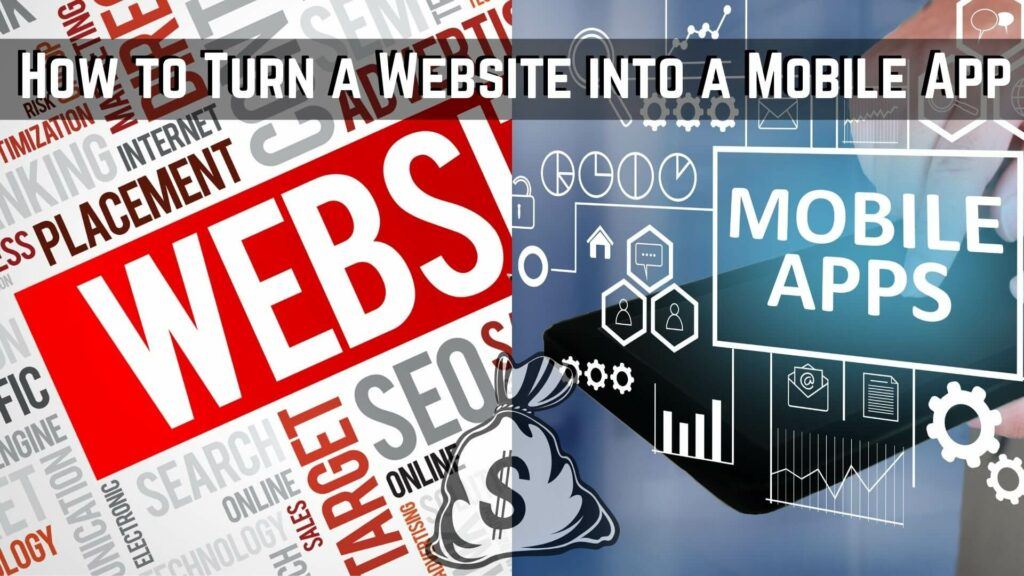How to turn a website into a mobile app, is something I get asked a lot in this business.
An app is a software program developed to run on a mobile device, such as a Smartphone or tablet. The app will be easy to use and expand for the user. Many different tools on the market can convert websites into apps.
The best of these tools will allow you to build native Android apps and submit them to the Play Store. If you are a blogger or developer, you may be wondering how you can convert your website into an app. Do you want to learn how to turn a website into a mobile application? Here are the steps to make it happen:
Table of Contents
ToggleDevelop the App for a Specific Device.
You need to develop an app for a particular platform if you want it to work on all devices. Besides, you should test your application on various screens and software versions. This will help make your app work perfectly.
Start a New Project.
You must create a team. And once you have a team, you should assign a project to each member. You can also form a one-person team.

To create a native app, you must know the programming languages used by each platform. You can hire a developer to develop an app for both iOS and Android platforms. This way, you can save money on hiring separate developers.
But, if you want your app to work on both platforms, you should hire a team of developers. The Android Studio is a free tool that allows you to develop apps for both iOS and Android. It supports C++, Java, and other common programming languages. It is an excellent choice for building a mobile application that can run on iOS and Android devices.
With the new technologies now, there are tools that can help you turn any website into an app without coding. You will learn more about the tools in this post.
Native apps are faster than other applications. They are also optimized for different device types. Facebook, for example, used to write its application using HTML5 code, which meant that it was slower on iOS devices. The developers changed the code to make it compatible with iOS.
With this change, Facebook users can download the exact version of the app. You can also balance the workload between multiple threads. The same thing applies to networking.
Design a Simple UI that will be Easy to Use and Expand.
The design will consist of a single page with a header and footer.
The header will consist of a logo and the app’s name. The footer will have the app’s menu at the bottom. The menu will have three options:
- To explore the website
- To explore the app
- To go back to the website
Websites are not always the best way to display content. This is why converting a website into an app can be an excellent idea for some companies.
A simple UI should be easy to use and it should be attractive. You want people to use your app and not just close it after they’ve used it once or twice.

Some apps have a minimalistic design, while others have more complex designs with many elements, such as social media buttons, sidebar menus, etc. The choice of design depends on how you want people to interact with your app.
Include Custom Feeds and APIs.
If you want to convert a website into an app, include API feeds. API feeds are just like RSS feeds, but they are specifically designed for apps. They display the latest data from your website or app.
The app should be able to update in real-time with any changes made to the website. It should also be able to receive data from third-party sources such as social media, weather, etc.
With the help of APIs and custom feeds, you can convert any website into an app.

Custom feeds are a set of RSS or ATOM feeds specially designed for a specific website. They are used to provide push notifications to users about new content published on the site.
On the other hand, APIs are sets of tools that allow developers to create apps for specific platforms or devices. And they have become popular in recent years because they allow developers to create apps without having to code all the features from scratch.
Custom feeds and APIs are the perfect solution for converting a website into an app.
The custom feed is a news feed that you can use within any website, blog, or social media page. It will display all of your content in an easy-to-read format that will update in real-time. The API is another way to convert websites into apps by giving developers access to some of the data on your site.
Consider a Hybrid Mobile App if You Have the Resources to do so.
A hybrid app is a mobile application created using web technologies like HTML, CSS, and JavaScript. It can be developed on the web or a device.
Hybrid apps are typically lighter than native apps and offer some advantages. They are easier to update and maintain because they don’t require any additional installation. They also provide a better offline experience because they can work without an internet connection.
If you have the resources to do so, consider converting your website into an app.

A hybrid mobile app is a website that has been converted into an app. It can be created using a web framework and some native code to make it work like a native app. A hybrid mobile app is usually easier to develop than a fully native mobile app because it uses the same codebase as the website.
The main advantage of this type of mobile application is that you can reuse your website’s content and design for your mobile app, which means you don’t have to spend time creating new content for your users on both apps.
The downside, however, is that it cannot offer all the features of a native application because they are not available in the web browser environment. The decision to convert an existing website into a mobile app should not be taken lightly.
As the number of device users grows, websites must be optimized for mobile devices. It is also essential for companies to consider the benefits of developing a hybrid mobile app if they have the resources.
A hybrid mobile app will provide users with web-based access and native features when accessing content on their phones.
Convert the Website into a Mobile Application.
80% of Smartphone users spend time on their devices to search the web. About 90% of their time is spent on apps, while only 10% is spent on websites. Furthermore, people use their smartphones for over four hours a day.

In addition, mobile apps are much more appealing than websites.
The easiest way to turn a website to a mobile application is to use custom development. Custom development will give you a highly functional, user-centric app. With native apps, you’ll get the same functionality and features, which is crucial for an app.
You’ll also have more flexibility. By choosing a native solution, you’ll get an application with complete functionality and integrations.
If you’re not a developer, it’s best to hire someone who will make a native app for you. This way, you’ll be sure that your project will get the recognition it deserves. A native app can have a lot of features that a website doesn’t have.
Create an Offline Mobile App.
You must remember that a mobile app is a good idea if your target audience is always on the go. If your target audience isn’t always available simultaneously, an offline version can be helpful.
You can easily switch between different apps using a website. You can also convert a mobile website into an Android or iOS app to promote your business.
Make it Easy to Share and Distribute.
Creating an app isn’t hard – you need a little bit of expertise. As a business owner, you don’t want to spend your time learning a new platform and adapting it to your target market.
It’s essential to make your site compatible with all popular mobile devices. And you must know the difference between a website and an app.
If you have a website, consider making a mobile app. The best way to turn a website into a mobile app is to create a prototype or MVP. An MVP app is a basic functional prototype of a full-featured mobile application.
It’s an essential first step to creating a successful mobile app. Then, you can refine the features and design. After obtaining user feedback, you can start building the final mobile version.
Once you’ve created a prototype, the next step is to decide on a structure. The number of screens determines the main functionality of an app.
A functional module is a single screen. It should have a single menu.
You’ll need a functional module for every page on your app. The main library should have an application that allows your users to interact with your features.
If you’re aiming to launch an app for your website, you should consider the mobile user experience. A native app will look more like a desktop version, but a native application will look like a hybrid app.
If you’d instead develop a hybrid, you’ll have to develop a web app instead.
Website-to-App Converter Tools
Here are some popular software programs for website conversion.
When choosing a website-to-app converter, make sure you select one that takes user behavior and best practices into account. Some tools will turn your website into a mobile application, but this won’t be the most effective option. You should also choose a program that can make your website a native mobile experience.
In most cases, online converters turn your site into a web view wrapper that opens in the browser and looks just like a native mobile app.

If you’re a developer, you’ll need to create a separate app from your website. While using native technologies will provide the best user experience, it will cost you more than using a website.
You should choose a program that offers simple steps to convert your website into an app to avoid this. In addition to these platforms, you should consider using Flutter, a new technology from Google. This technology uses native components and logic, and it works across the platforms.
Converting a website into an app will give you the highest possible UX for your users. A good app has better navigation, a more engaging user experience, and a faster loading time.
Once you’re done creating your website, you can start thinking about how you’ll convert it into an app. If you’ve ever created an app, chances are it is a mobile version of your original.
You should use an app that offers the same functionality. If you’re a blogger, the first step in your conversion should be to get your content into a mobile app. It’s a great idea to have a website that allows you to expand your audience with more content and features.
These tools allow you to conveniently transform a website into an iPhone or Android app. If you’re a developer, you can choose a tool that will customize the look and feel of your app. Select a design that best suits your brand, but if you’re just starting, you’ll want to use a tool that offers plenty of features.
There are many free and paid tools for website conversion. These tools will let you customize your app with different features. You can also opt to use a website that already has a mobile version.
For those who want a fully-featured app, Appy Pie can help them do so. This website conversion tool is easy to install and works with various websites, including Wix. The free version will suit a simple website and a small mobile app.

There are also several other apps available for a fee. If you’re working to turn a website into an app, try AppsEazy. It’s a robust suite of software that will convert your existing website into a mobile application.
While some limitations exist, the best converter tools will allow you to make your application. The most popular ones are free, but some may require a subscription.
Other conversion tools include:
- BuildFire
- Como
- Mobiloud
- Ideapress
- GoNative
- AppsGeyser
How to Turn a Website into a Mobile App Conclusion
By using a Website as an App Converter, you can improve the user experience of your mobile website and gain a competitive advantage in the mobile app market. If you’re looking to convert your website into an application, consider investing in a tool that can simplify the process.
If you would like to know more about building your first website for FREE with 10 lessons and video tutorials included then you should check us out at Wealthy Affiliate.

Building a website is just the start, making money will take time.
If you have any questions let me know in the comments or flick me a message at mark@theretiredaffiliates.com and I will get right back to you.
Any/all links on this site may be affiliate links, and if you make a purchase through one of them, I will earn a small commission at no extra cost to you. Read the full affiliate disclosure here.
Mark,
CEO and Founder of The Retired Affiliates.











